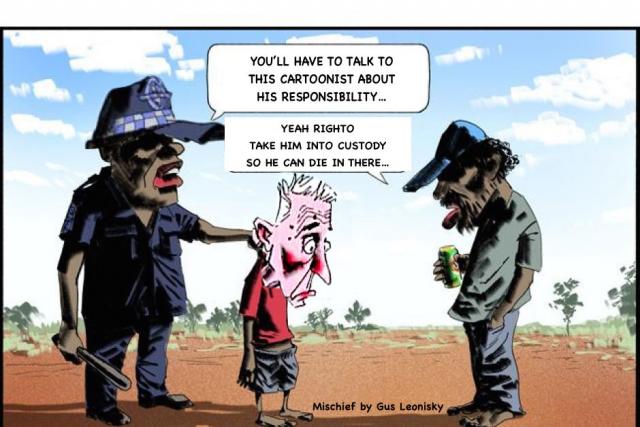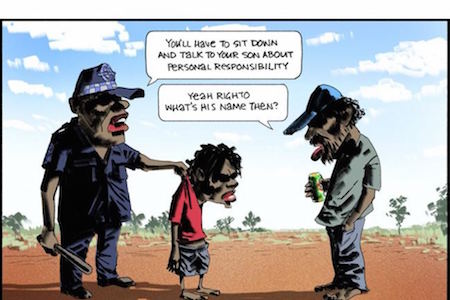Search
Recent comments
- AfD....
8 min 12 sec ago - undesirables...
24 min 45 sec ago - assistant spies......
49 min 54 sec ago - brics.....
3 hours 57 min ago - nuke fukus.....
8 hours 6 min ago - dead or alive?....
8 hours 16 min ago - who what when where?....
9 hours 52 min ago - elon vs kanbra.....
10 hours 46 min ago - tanked think-tank.....
11 hours 47 min ago - (PAUSE)....
12 hours 14 min ago
Democracy Links
Member's Off-site Blogs
going backwards...
 morelleak
morelleak
Thirty years after the Aboriginal Deaths in Custody Royal Commission, is it time we admit that reconciliation is failing?
By Stan Grant
More than that, isn't it obscene to talk about "reconciliation" in the face of ongoing Indigenous suffering?
Achieving reconciliation was one of the recommendations of the commission, but how can we speak of coming together, healing or unity when Aboriginal people remain locked up in such shocking numbers?
Three per cent of the population comprise nearly 30 per cent of those behind bars. Look closely and it becomes even more alarming. In Western Australia, 40 per cent of prisoners are Indigenous. In the Northern Territory, it is more than 80 per cent.
Among youth it is even worse. Half of all children in detention nationally are Indigenous. In the NT, more than 90 per cent of all juveniles detained are black.
Let's try another ‘R' word: rejection
The federal government rejected the Uluru Statement from the Heart which called for a voice enshrined in the constitution to allow Indigenous communities greater input into government policy.
A voice that would come from the community and be accountable to the community, that could offer the hope of better policy outcomes, help keep people out of prison. Rejected.
Truth telling: rejected. The Uluru Statement asked for a full reckoning of our history.
Still today, Australians are woefully ignorant of the truth of Australia: of invasion and massacre and segregation and stolen children.
Australian political leaders still cannot utter the word genocide. We use weasel words like "settlement" and "discovery" and "dispossession" because we cannot use words of truth.
There is still no plaque on the War Memorial's Roll of Honour for the Aboriginal warriors who fought and died defending their land in Australia's frontier wars.
Peace making: rejected
The Uluru Statement wanted a Makarrata Commission (named after a Yolngu word meaning to come together after a struggle).
The Makarrata Commission could have negotiated a just settlement overseeing the terms of agreement.
Instead what we have is reconciliation. No treaty, no meaningful recognition: just reconciliation — a word that rings like a hollow drum.
Reconciliation itself was always a poor substitute for another unutterable "R word": rights.
The reconciliation project was born of failure: a substitute for then prime minister Bob Hawke's promised treaty in 1988.
Three decades later, there is still no treaty. Reconciliation has become measured by employment targets, apologies or welcomes to country.
Meaningful talk of rights or sovereignty are banished from political discourse. But not from Indigenous peoples themselves.
Here's another 'R' word: refusalMany Indigenous people are practising an ethical refusal to grant honour to the nation. Refusing to sing the national anthem or stand for the flag; refusing to acquiesce to a country that has failed its own test of equality, egalitarianism or justice.
The political claims of First Nations people ask hard questions of Australian liberal democracy.
Those claims challenge the legitimacy and the virtue of the nation.
How can a country that boasts of its tolerance, cohesion, multiculturalism, peace and prosperity allow such gross injustice, marginalisation and misery for so many of the First People?
Why is Australia apparently so comfortable with that suffering?
We could fix thisAustralia has shown its capacity to deal with a crisis with its response to the COVID-19 emergency.
Public will and political leadership saw off the worst of the pandemic. As it surely passes, Aboriginal people will still die 10 years younger than the rest of the population, will remain the most impoverished and imprisoned people in the country.
If Australian democracy can apparently work for the greatest number of the population, why does it so fail the people of the First Nations?
Sydney University professor and philosopher Duncan Ivison, in a recent book, poses the question: Can Liberal States Accommodate Indigenous Peoples?
It is a pertinent and timely enquiry. Globally, liberal democracy is being tested.
We are in the midst of a democratic recession. Populists, demagogues stoking political tribalism and exploiting fear and anxiety, have distorted democracies.
People are losing faith in institutions and the soft guard rails of democracy — free and robust media, independent judiciary — are being eroded.
Democracies are rotting from within, crippled by gross inequality, concentration of power and wealth, and a historical legacy of racism and sexism.
It happens at a time when a rising and powerful China presents an authoritarian threat.
We're failing our own testPrime Minister Scott Morrison this week called for people to fight to preserve liberal democracy. Yet here in Australia we are failing the test of our own democracy.
After 200 years of liberalism and more than a century of federation, the First Peoples of this land are still locked up and dying in our jail cells.
The Uluru Statement, Duncan Ivison argues, presented an opportunity for "a refounding of Australia".
For Aboriginal people to accept the legitimacy of the state, Australia would need to "embrace a more historically informed approach to justice".
It would mean putting rights and justice ahead of comforting notions of reconciliation — going beyond an apology or a welcome to country — that currently does more to assuage white sensitives than truly recognise the rights of Indigenous people.
Ivison is a liberal idealist: he believes in liberalism's redemptive power and capacity for renewal.
Indigenous people burying their dead too young, mourning deaths in custody and seeing another generation lost to prison would have every right to be cynical or even dismissive.
Instead of reconciliation here's another "R word" that captures the mood of Indigenous people: rage.
Read more:
Yes I know. Bill Leak died and I should not sully our memory of him... But in the later years of his life he worked for the Murdoch empire and it is ny view that he sullied himself with cartoons that were below par like this one I used to make up the one at top.
 billtoon
billtoon
Free Julian Assange Now !!!!!!!!!!!!!!!!!!!!!!
- By Gus Leonisky at 18 Apr 2021 - 7:26am
- Gus Leonisky's blog
- Login or register to post comments
and things got worse...
There was a time when Bill Leak was more understanding...
increased discrimination...
Major discrimination against Aboriginal and Torres Strait Islander people – like being unfairly denied a job or unfairly discouraged from continuing education – remains at elevated levels and is far higher than for the rest of the population, according to new data.
Researchers at Monash University, on behalf of Inclusive Australia, surveyed people over several years on a number of measures, including their experiences of discrimination, feelings of belonging and wellbeing, and prejudices towards minority groups.
The survey found the percentage of Aboriginal and Torres Strait Islander people who reported experiencing at least one form of major discrimination increased dramatically in 2019 from 28.6% to 52.1%, and remains very high at 49.7%.
Board member of Inclusive Australia, Yorta Yorta man Ian Hamm, thinks the sustained rise is a symptom of Covid-19 igniting and exacerbating existing prejudices.
“I think it’s a bit of a Covid reaction because, when we look at the past 12 months, there has been a fair bit of tribalism, for want of a better word, where people retreated to their particular patches. And probably, regrettably, a bit of intolerance was shown,” Hamm said.
Around one in five Australians have recently experienced a form of major discrimination, described in the report as including “types of serious unfair treatment, such as being unfairly denied a promotion or job, or discouraged from continuing education”.
Young people and Aboriginal people were the groups that reported experiencing the most discrimination, with a sharp rise in reported discrimination towards Indigenous people in December 2019 onwards:
Hamm said the Black Lives Matter movement has been a “pinch point” for racial intolerance.
“While we’ve gone a long way to advance on a lot of issues, the anchor point hasn’t really moved in 30 years,” he said. “We have more Aboriginal people in custody per head of population than we did in the 1990s. The rate of average death in custody hasn’t improved. If you take that as a starting point, then you can see why it’s sensitive to people. But some people take the view of ‘what’s the problem?’.
“I think the Black Lives Matter movement really was a pinch point on that. The timing of it, in terms of when Covid was really happening, could not have been worse in regard of how did the Aboriginal protest movements across Australia look, at a time when everybody was being told to socially distance, was being told that we had to close borders, we had to not go outside, and all of a sudden you’ve got all these people on the streets protesting.
“I think the other thing is that people are reporting it, or the mechanisms to seek out the reporting of it have improved. So there’s a combination of things.”
The survey also measured “everyday” discrimination, defined as “more chronic, routine, and relatively minor experiences of unfair treatment”, like “being treated with less respect and courtesy, receiving poorer service than others at restaurants or stores, or being called names”.
Everyday discrimination was highest for Aboriginal people among the groups surveyed, with a sharp rise from December 2018 onwards.
Read more:
https://www.theguardian.com/australia-news/2021/may/24/discrimination-against-indigenous-australians-has-risen-dramatically-survey-finds
Read above
flog the police...
The family of an Indigenous man says he has fled a remote south-west Queensland town fearing for his safety after a local police officer threatened to "flog" and "hurt" him.
Key points:Video footage has emerged of the policeman in the remote town of Cunnamulla making threats against the 28-year-old man to his sister, Jacinta Munn, sparking informal internal inquiries within the Queensland Police Service (QPS).
The man's family and an Indigenous rights expert are calling for immediate action to make him feel safe enough to return home.
The footage, captured about two weeks ago, shows the Cunnamulla officer in the driver's seat of the marked police car, asking Ms Munn if she had seen her older brother.
His family said police were looking for him over "about $40 worth of stolen Keno tickets", but police would not comment on the circumstances.
"If he comes to me, it looks a lot better for him, because either way he's being arrested," the officer says in the video.
"If you do see him, tell him to come see me before I find him, or else I'll flog him."
Ms Munn replies: "Well, he'll get charged — I don't think you can flog him."
"No, no, I'm just going to hurt him a little," the officer says.
Read more:
https://www.abc.net.au/news/2021-12-03/cunnamulla-police-officer-threatens-indigenous-man-on-camera/100669234
Read from top.